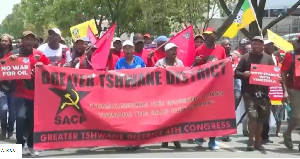or a Tacit Approval for Regime Change?
By Kofi Ata, Cambridge, UK,
• Nixon began a second term as President of the United States;
• Lyndon B Johnson passed away, leaving no former US President living;
• Libyan Arab Airlines Flight 114 (Boeing 727) was shot down by Israeli fighter aircraft;
• Vietnam War ended;
• Watergate Scandal began in the US;
• Soviet Union Leader Brezhnev paid a state visit to West Germany;
• President Nixon denied all knowledge of Watergate Affairs;
• Caribbean Community and Common Market (CARICOM) was inaugurated;
• Federal Republic of Germany (FDR) and the German Democratic Republic (GDR) admitted into the United Nations;
• Henry Kissinger became US Secretary of State;
• President Salvador Allende was assassinated in a military coup in Chile;
• Spiro T Agnew resigned as US Vice-President after pleading no contest to charges of income tax evasion;
• Egypt and Syria attacked Israel in retaliation for the 1967 defeat, starting the Yorm Kippur War;
• Arab oil embargo against countries that supported Israel triggered world energy crisis;
• President Nixon ordered Attorney General Elliot Richardson to dismiss Watergate Special Prosecutor (Archibald Cox) but Richardson refused and instead resigned with his Deputy and the third in command at the Justice Department, the Solicitor General. Nixon fired Cox leading to calls for his impeachment;
• Greek dictator George Papadopoulos was ousted in a military coup;
• Gerald Ford became US Vice-President; and
• OPEC doubled price of crude oil, etc.
What is common to the above historical events? Historians and students of History or International Relations may recognise that they all occurred in the year 1973. But the article is not about and has nothing to do with the year 1973. I am certain that students of International Humanitarian Law (IHL) and followers of international law do know from the above title that, the 1973 in the title refers to the United Nations Security Council Resolution 1973 that was passed on 17 March 2011 that authorised the use of force against Libya. The use of force against Libya is perfectly legal under international law as it was authorised by UN Security Council Resolution. However, concern has been raised in certain quarters that the Resolution’s open ended nature could be problematic and could set a precedent for regime changes in the future under the guise of humanitarian intervention.
Prior to writing this article, I posed the same question (that is, the topic) at the International Humanitarian Law Group on LinkedIn (the social network for professionals) for discussion. The responses I received from experts and international humanitarian lawyers clearly indicated that there are differences of opinion on this matter. In my introductory remarks to the discussion, I posited the view that, the Resolution could set a precedent by tacitly giving approval for regime change. From comments by LinkedIn Group members, some experts and lawyers agreed with me and others disagreed. A few even suggested that since the Resolution was more about “jus ad bellum” (prior to the use of force) and IHL deals with “jus in bello” (during the use of force) my question was inappropriate for the forum. I and many commentators disagreed as in my opinion there is no clear demarcation between the two areas of international laws on the use of force. In this article, I will attempt to consider whether Resolution 1973 has ushered in a new World Order of regime change within the context of international law.
I have read a number of articles on the Ghanaian electronic media on the Libyan and other conflicts in Africa. What particularly caught my attention were the articles by Transient Justice on 23 and 25 April 2011 due its one sided and narrow perspective. Bernard Asher wrote an interesting rejoinder on 24 April, but that also fell short of the legal and customary practice analysis. Mine is therefore a contribution to the ongoing debate but from the legal perspective. In early January, I wrote an article on the Cote d’Ivoire crisis with a comprehensive analysis on the use of force on humanitarian grounds and do not intend to undertake a review of the same subject. There are a number of legal issues as far as Resolution 1973 is concerned but I will attempt to consider only one of them (since the rest are uncontroversial (as the use of force is authorised by the Security Council, there is less legal ambiguity). The one for my consideration is state sovereignty and humanitarian intervention or the protection of human rights.
Before I continue, may I take this opportunity to clarify some misconception that my article on the Ya Na judgement on Ghanaweb (in early April) might have created? From comments on the article, most readers did not believe that I am not a lawyer. I want to clarify that beyond any reasonable doubt by explaining why I am not a lawyer. I have no law degree and have never undertaken legal training but I have a reasonable level of knowledge and understanding of some aspects of law from both work and academic studies. For example, I studied IHL as part of MSc Human Rights course. Again, my area of work involves having knowledge and understanding of Employment, Discrimination and Human Rights legislation. I do have Certificate in Employment Law and was appointed by the Secretary of State for the then Department for Trade and Industry and served as a member of Employment Tribunals here in England. In other words, I am not totally naive in matters of law. I was humbled by suggestions from readers that I consider a career in law. You will be please to know that I will not be apologising for writing on another legal matter as this is one of the three areas of law that I have good knowledge and understanding in, so if I get it wrong, lawyers have every right to come after me. I will do my best to get it right though the fact still remains that, lawyers (or the law profession?) never agree on anything, instead, they agree to disagree on everything.
Let’s now look at the relevant section of UN Security Council Resolution 1973 that authorised the coalition action against Libya. Section 4 of the Resolution states, “Authorizes Member States that have notified the Secretary-General, acting nationally or through regional organizations or arrangements, and acting in cooperation with the Secretary-General, to take all necessary measures, notwithstanding paragraph 9 of resolution 1970 (2011), to protect civilians and civilian populated areas under threat of attack in the Libyan Arab Jamahiriya, including Benghazi, while excluding a foreign occupation force of any form on any part of Libyan territory, and requests the Member States concerned to inform the Secretary-General immediately of the measures they take pursuant to the authorization conferred by this paragraph which shall be immediately reported to the Security Council”. Resolution 1973 was a follow up to Security Council Resolution 1970 that called for an end to hostilities by the parties concerned to enable the return of humanitarian agencies to provide humanitarian assistance. Resolution 1970 left the door open for consideration to taking additional appropriate measures, as necessary to achieve its goals. It is also important to note that 1973 is a Chapter VII (of the UN Charter) resolution. For readers who are not conversant with UN Charter, Chapter VII deals with “Action with Respect to Threats to the Peace, Breaches of the Peace, and Acts of Aggression”. The statement “to take all necessary measures” in Resolution 1973 is not defined or interpreted. That left room for the coalition or NATO to act as they see fit. It is therefore not strange that ‘regime change’ is now considered a “necessary measure” though some NATO members differ on this. If regime change is tacitly approved under this resolution, does it mean that the sovereignty of Libya has been breached by the UN, NATO or the coalition countries?
The right to state sovereignty and self determination is enshrined under international law Chapter 1 of the 1945 UN Charter, Article 1(1) of the Charter states “to maintain international peace and security, and to that end: to take effective collective measures for the prevention and removal of threats to peace, and for the suppression of acts of aggression or other breaches of the peace, and to bring about by peaceful means, and in conformity with the principles of justice and international law, adjustment or settlement of international disputes or situations which might lead to a breach of the peace”. Article 1(2) states, “To develop friendly relations among nations based on respect for the principle of equal rights and self-determination of peoples, and to take other appropriate measures to strengthen universal peace”. Article 2(4) of the Charter also states: “All Members shall refrain in their international relations from the threat or use of force against the territorial integrity or political independence of any State, or in any other manner inconsistence with the purposes of the United Nations”. Again Articles 1(1) of both the 1966 UN International Covenant on Civil and Political Rights and the UN International Covenant on Economic, Social and Cultural Rights state as follows: “All peoples have the right of self-determination. By virtue of that right they freely determine their political status and freely pursue their economic, social and cultural development”.
Legally, sovereignty has two aspects: the freedom from outside interference and the freedom to act as the sovereign sees fit within agreed borders. However, as no sovereign state is an isolated island and her actions and or omissions have consequences far beyond her borders. Sovereignty is therefore relative rather than absolute. To put it diplomatically, the concept of sovereignty exposes the doctrine of non-interference to be too simplistic and perhaps disingenuous in contemporary international relations. I am from the school of thought which holds the view that, freedom from outside intervention is contingent upon a conduct within the state. Moreover, the traditional understanding of the freedom to act within borders has become circumscribed, especially in cases of genocide and moreover, notions of identity of the sovereign have also shifted. For example, whilst in the past, states claimed that sovereignty lied with the ruler, in today’s open and democratic society and the urgency to protect human rights, sovereignty resides with the people. This is a significant and powerful shift that justifies legitimate intervention on behalf of the people against its government. So when the ruler/s or the state attacked its own people in Libya, state sovereignty was lost and that necessitated the right by the international community to act to restore international peace and security and to protect and safeguard human rights.
As established, sovereignty is conditional and also linked to internal legitimacy and requires governments to respect at least, minimally, the wellbeing and human rights of their citizens. It follows then that, a state that is oppressive and violates the autonomy and integrity of its subjects as was in the case of Libya, forfeits its moral claim to full sovereignty and territorial integrity. There should be no illusions from the above that Libya’s sovereignty is not devoid from its obligation to respect human rights because contemporary international law and customary practice has established beyond any reasonable doubt that serious violations of universal human rights are now matters of international concern and responsibility. In other words, the obligation on states to respect and protect the basic rights of their citizens and all human persons under their jurisdiction is a matter for the international community. That is, the obligation to respect and protect human rights is owed “erga omens” (towards all).
When the Libyan leader threatened to conduct house-to-house searches for the rebels, it was abundantly obvious that there would have been a humanitarian catastrophe if the international community had not acted to prevent another genocide in Africa. Simply put, the international community could not sit idle and watch as gross and egregious breaches of human rights potentially involving loss of tens or hundreds or thousands of innocent people, and amounting to crimes against humanity were about to me carried out just because Libya is a sovereign state would have been unacceptable. Another Rwanda? Not in my name. Again, since sovereignty resides in the hands of the people, the invitation by the rebels to the international community for intervention also legitimised the NATO action.
The conflict in Libya also threatened the maintenance of international peace and security and therefore a violation of UN Charter Article 1(1). Again, the use of force did not breach Article 2 (4) as I mentioned earlier, it was authorised by the Security under Chapter VII of the Charter. The UN therefore had a duty to act to maintain international peace and security because the crisis directly affected international peace and security. Some experts have described "devoir d'ingérence" (duty to intervene) as a new avatar of the old "humanitarian intervention". Its defenders (including myself) stress the right for humanitarian organisations such as NGOs to have access to the victims of a humanitarian catastrophe or an impending one, whatever its causes, without having to request the consent of the territorial state.
I appreciate that some experts and appeasers claim that, the conflict is an (internal) civil war and therefore, international law did not apply. I totally disagree with such a view because internal conflicts can indeed be internationalised for there are factors that international bodies have used to determine whether a non-international armed conflict exists. For example, the International Committee of the Red Cross (ICRC) has conducted detailed study of customary international humanitarian law by employing a two-pronged test on such matters. The first is the intensity of hostilities, and the second being the organisation of the armed group(s). In qualifying an armed conflict or in determining whether or not the situation in Libya constituted an international armed conflict, it suffices to say that one must realise that international law provides a range of modalities through which a state or international body may address the use of force violations, and discerning which modalities may be utilised often requires a legal characterisation of the situation in which the violations are committed. Examples of internal conflicts becoming internationalised are evidenced where Non-State Actors (NSAs), such as mercenaries, and neighbouring states get involved. The socio-economic impact of refugees fleeing conflicts for safe havens in other states also can lead to situations where internal conflicts become internationalised. The conflict in Libya undoubtedly led to massive displacement of foreign workers and huge refugees fleeing to neighbouring countries. There were also reports of Gaddafi’s government recruiting mercenaries from some neighbouring African countries to fight the rebels. For these and other reasons, the argument that the conflict was an internal one and therefore cannot be internationalised, falls flat in the face of the evidence and international customary law.
Having said the above, is regime change now acceptable and what are the implications of Resolution 1973 if it unwittingly gave approval for regime change in Libya? United States and United Kingdom were condemned for their regime change action against Saddam Hussein in Iraq (without UN Security Council approval). I do remember the diverse legal opinions on whether the famous or infamous Resolution 1441 authorised the use of force against Iraq? Do not get me wrong, I am not a fan of Gaddafi and his cabal of dictators and human rights abusers. My concern is, once regime change with tacit approval by the international community happens in Libya, where does it stop, does it become the international customary practice and who will be next on the list (Mugabe in Zimbabwe)? This is particularly disconcerting because who and what criteria would be relied upon to decide which government/s or leaders should be removed from power are not yet decided. Would serious violation of human rights be the sole factor or would democracy be part of the criteria? These are matters that should concern all citizens of the world, especially when the impending regime change in Libya with the support of NATO is not simply a matter of egregious human rights violations and lack of democracy but above all, safeguarding the strategic interests of some of the NATO members. One cannot deny the fact that, investment in Libya’s oil by the west and the continuous supply of Libyan oil to the rest of the world are contributing factors that might have precipitated the regime change mentality by NATO. Would NATO have acted and considered regime change had Libya been one of the African countries without strategic resources such as oil? Why not in the Darfur region of Sudan and Congo where there were serious abuses of human rights or even Syria and other undemocratic and oppressive Middle eastern regimes currently experiencing similar conflicts that also constitute threats to international peace and security and human right abuses? I guess, Yemen and others are strategic allies of the west in the global fight against global error.
The consequences of Resolution 1973 would be far reaching and already, I am convinced that it persuaded France to assist Quattara’s military force to capture Gbagbo to bring an end to the political stalemate in Cote d’Ivoire to prevent a civil war and humanitarian crisis in the region. Another concern of mine is that, the practice of regime change if it ever becomes a the norm or the exception it will be used selectively against weaker states with strategic assets and poor countries such as Somalia and others would be left to sort it out amongst themselves despite serious human rights abuses. For example, will NATO use force against Iran in the name of human rights and democracy? The inconsistency of the west could be used by those who oppose humanitarian intervention in whatever situation to wrongly justify their position and defend the indefensible such as the dictatorship in Libya and human rights abuses that were committed by the Gaddafi regime. My only hope and this may be hope against hope, is that, Resolution 1973 will not be a free licence for regime change in the future or a Darwinian theory of natural selection (survival of the fittest). Instead, and should it be successful in Libya, the criteria for the future will be based purely on humanitarian grounds because as Lord Fran Judd said, “human rights are not an optional extra for a civilised society but above all, they are the cornerstone of stability and security across the world”
By Kofi Ata, Cambridge, UK
Opinions of Tuesday, 26 April 2011
Columnist: Ata, Kofi














